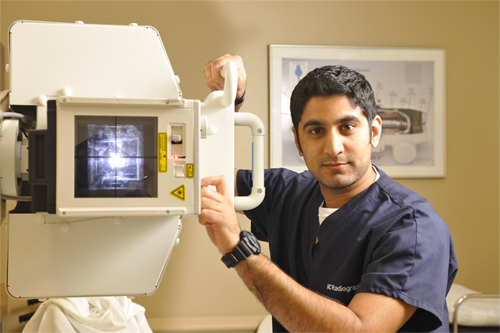Get More Info Now
(708) 237-5000
Associate Programs
An associate degree is an excellent way to receive a well-rounded college education that still gets you out of the classroom and into the workforce as quickly as possible. According to the Bureau of Labor Statistics, earning your associate degree can mean taking home an extra $141 every week (over $7,300 annually) compared to those who just have a high school diploma. Associate degree holders also experience an unemployment rate a full percentage point less. At Northwestern College, our associate degrees combine quality, hands-on training in the career skills you'll need with strategic general education courses that help you realize your full potential.
Programs
Learn the radiology techniques, procedures, and equipment that can help in the diagnosis and treatment of illnesses, diseases, illnesses, and more.
Become a part of caring for your community by studying the foundational knowledge and skills and combining that with principles of logic, ethics, and human compassion in a career as a nurse.
Combine skills in healthcare, administration, and information management in order to collect, analyze, and report on medical data used for patient care and reimbursement.
Average Class Size: 14
Benefit from the small class sizes and individualized attention that an NC education provides.
120 Years’ Experience
We have been part of the Chicagoland area for well over a century, helping students just like you to succeed.
Programs in Fast-Growing Careers
We design our certificate and degree programs to get you out of the classroom and into the workplace quickly.
Accredited Education
NC is regionally accredited by the Higher Learning Commission and holds various programmatic accreditations.

Radiologic Technology
Associate of Applied Science Degree in Radiologic Technology
Radiologic technology is the practice of using radiation — generally in the form of X-rays — to provide images of the bones, organs, soft tissue, and vessels of the human body in order to help diagnose and assess patient's conditions. Radiologic technologists are also sometimes known as X-ray technologists or radiographers and are trained to do tasks like:
While most of the time we think of radiologic technologists as just being synonymous with X-rays, the truth is many times they’re trained in the use of multiple types of diagnostic equipment, including mammograms and computed tomography (CT) machines. Depending on the size of the healthcare facility where the radiologic technologist works, you may often specialize in one type of machine or another.

Nursing
Associate of Applied Science Degree in Nursing
The more our health system evolves, the more we recognize how crucial a role registered nurses play when it comes to coordinating and providing patient care. Registered nurses work as part of an overall team, with physicians and medical specialists to do things like observe and assess patient's conditions, record medical histories and presenting symptoms, consult with doctors and administer prescribed treatments, assist in performing tests and procedures, and educate patients about their care and how to manage illnesses or injuries.
Nurses can often specialize as well, focusing their careers on areas like:
Still other registered nurses use their education and experience to become nurse educators, helping to train the next generation of students, or choose to work as healthcare consultants or hospital administrators. With the right education and certification, nursing can offer a wide world of different options.

Health Information Technology
Associate of Applied Science Degree in Health Information Technology
These days, every medical facility — from top research hospitals to grassroots-level nonprofit health clinics — relies on electronic record keeping, governed by specialized rules and regulations in order to preserve patient privacy and confidentiality. Health information technicians, sometimes called medical records technicians, are tasked with the organization and management of this sensitive data, with duties that include:
Because of the nature of the data and information being managed, maintaining the confidentiality of patient's records with the utmost integrity is a key factor in the profession. And with everything located online, health information technicians these days must be knowledgeable about the digital databases they utilize and how to keep them secure from any unwanted access.
Testimonials
Kareema Davis, Class of 2020, Nursing
9400 S. Cicero Ave., Oak Lawn, IL 60453 • Copyright © 2023 Northwestern College • All Rights Reserved.
